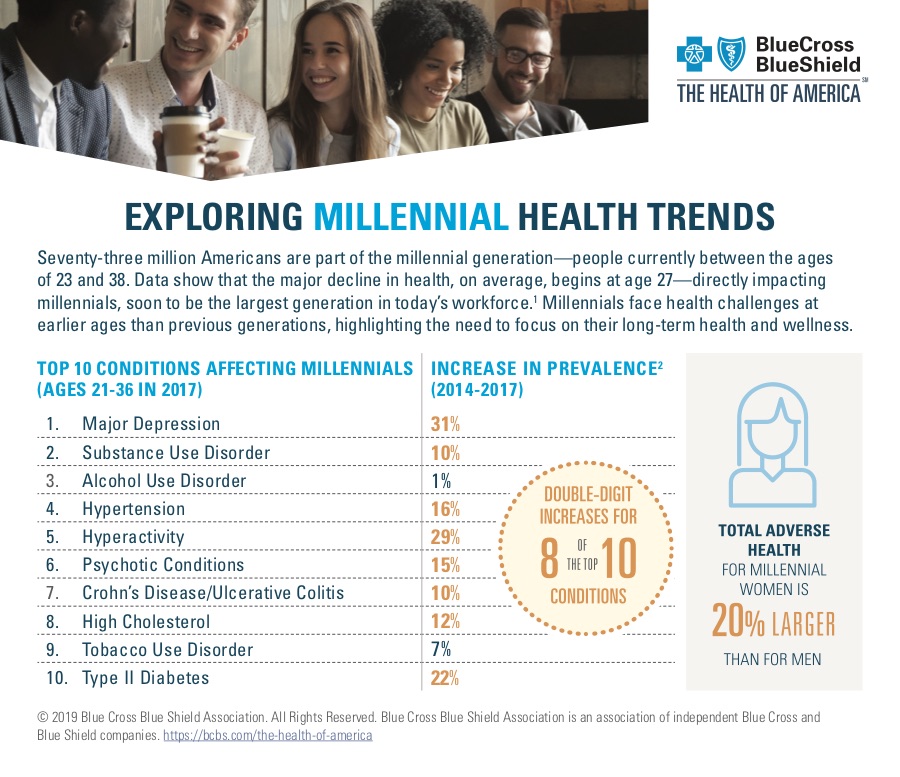
New study shows Philadelphia region millennials are less healthy than national average
A BSBC Health of America study found that millennials are being more adversely impacted by behavioral health conditions.
Millennials in Philadelphia are less healthy than the national average, according to an April 2019 Blue Cross Blue Shield Health of America report.
The report, which looked at 2017 member usage, drew from data about 10.4 million United States millennials born between 1981 and 1996. It found that the Philadelphia region’s millennial population was more adversely impacted by behavioral health conditions such as depression, anxiety, and substance use disorder.
The study also found that a third of millennials have health conditions that reduce their quality of life and life expectancy.
Dr. Ginny Calega, vice president for medical affairs at Independence Blue Cross, noted that the report is not all doom and gloom, but rather an opportunity to educate members. For example, one factor highlighted by the study is that today’s millennials engage differently with the health care system than previous generations. This is evident in the number of people ages 21-36 who do not have a primary care physician, also known as a PCP. The Health of America report shows that only 68% of millennials have a primary care physician, versus 91% of Gen Xers.
“That’s a real gap, because even at the age of 21 to 36, there are important things that primary care physicians will discuss with those individuals,” Dr. Calega said.
This includes providing preventative treatments, routine physicals, and looking at whether a patient may be at risk for certain medical conditions based on family history.
“It’s important to have a relationship, an ongoing relationship, with a primary care provider,” Dr. Calega added.
The biggest health differences between millennials and their Generation X counterparts was the higher impact of physical conditions driven by increased cardiovascular and endocrine conditions. In addition, the report also found that millennials are more frequently diagnosed with eight of the top 10 health conditions than Gen Xers. Six of those health conditions are connected to behavioral health.

“Whether you’re talking about depression or alcohol use or substance abuse, there really were a high predominance of behavioral health issues in this population,” said Dr. Calega. “Because it’s a claim-based data, you can’t really say why that’s occurring, but it is concerning.”
Additionally, the report found that millennial women are 20 percent less healthy than their male counterparts, specifically driven by higher rates of major depression, type II diabetes, and endocrine conditions.
As a way to identify key drivers of millennial health and how to improve it, Blue Cross Blue Shield began hosting Millennial Health Listening Sessions across the country, starting with one hosted by Independence in Philadelphia in April. The sessions have been attended by millennials and health care providers.
Dr. Calega said these sessions are important to help Independence understand why this pattern exists and how to evolve the health care system for the millennial generation. The goal is to discover what Independence can change from a provider, delivery, technology, and outreach standpoint to help engage millennials.
RELATED CONTENT
The sessions will also provide an opportunity to listen to millennials from across different geographic regions and hear different perspectives, as well.
In November, BCBSA and Independence will host a Health of America conference in Philadelphia with providers, thought leaders, and patients. The goal is to gather what was learned from the listening sessions and explore that information, ultimately leading to an increased understanding what can be done to help improve the health of millennials.
“The ultimate plan is not just about Independence members but really about the community as a whole,” said Dr. Calega.
In the meantime, however, millennials also have a critical role to play in improving their own health.
“Instead of getting episodic care from an urgent care center, it would be helpful for millennials to engage with a primary care provider on an ongoing basis so that they can develop a relationship of more personalized care,” Dr. Calega advised.
Independence has been very active in finding new and innovative ways to reach and engage the membership population.
One of those services, “On to Better Health,” allows members to use screening tools to help determine if they may have a particular behavioral health condition, such as anxiety or depression If so, the patient is directed to web-based, self-directed modules to help better understand how to manage that condition.
“We have both screening tools as well as cognitive behavioral therapy tools that can help someone start to take charge of their care,” Dr. Calega iterated.
Overall, each service and endeavor functions to aid and improve health.











LEAVE A COMMENT: